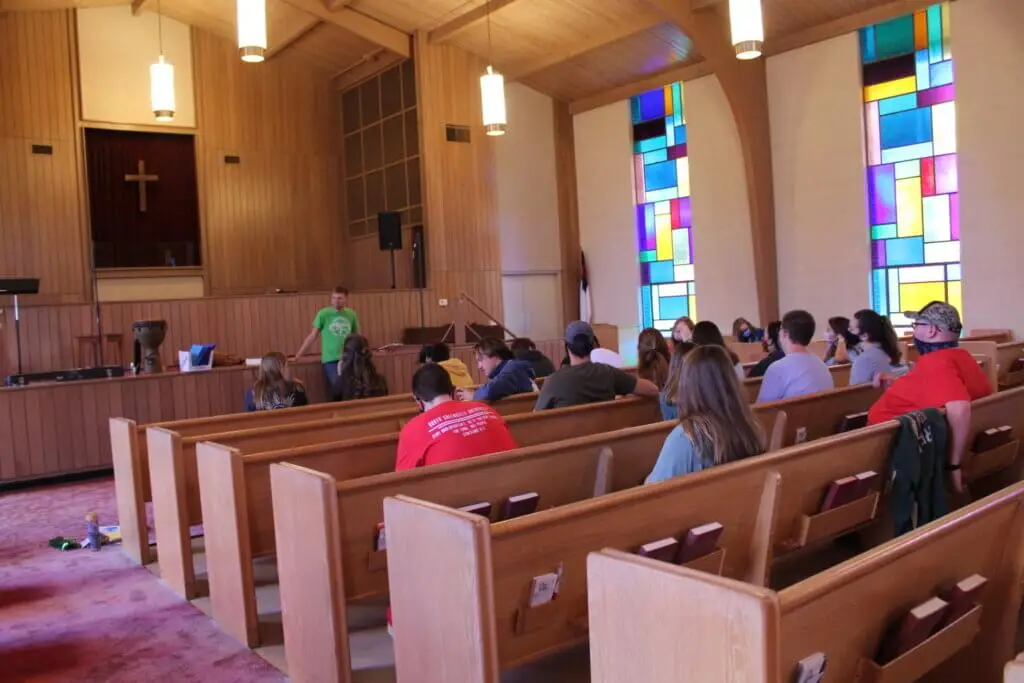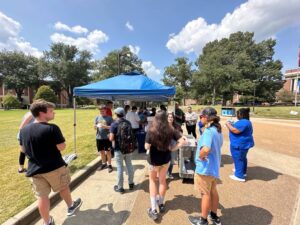My first day on the campus of Clemson University in 2014 was a breeze. I stepped out of my car that held all of my belongings and within two minutes everything was out of the car and on the way to my dorm room. There were three letters on the shirt of every person that carried my couch, TV, clothes, shoes, toiletries, and bookbag: FCA. The students associated with Fellowship of Christian Athletes took a day that should have been stressful, physically draining, and emotional and made it one of the easiest move-ins ever. As I was thanking each of the students, one of the guys that helped with move-in introduced himself, handed me a card with their welcome week events, and gave me a personal invitation to the events.
As somebody who had grown up in the church his whole life, it did not take me long to recognize that the campus was full of campus organizations, not churches, helping students move into their dorms. I was slightly confused as to why churches would not be jumping at the bit to actively engage new students on campus. It was not until years later that I realized that churches are often not given the opportunity of being “official” campus organizations which keeps them from on campus activities like move-in day. Campus ministries have a unique opportunity that churches do not have at the majority of college campuses, being listed as official campus organizations.
So, what do church college leaders do with this fact? Well, it is really simple. There are two options in this very real scenario; we either let campus ministries act alone and see them as “competition”, or we work alongside them and reap the major benefits of on-campus organizations. Church college leaders must see campus ministries as a supplement to the local church rather than a competitor. Not only are the campus ministries on the front lines every single day, they have access on-ramps to campus life that churches often do not have access to, as shown in my story of day one on campus at Clemson University. What I did not realize until years later is that the church that I attended while in college commissioned their people to work alongside the campus ministries on that move-in day. And it was on that move-in day that I was also invited to the church I attended for four years and was discipled through.
Church college leaders should love campus ministries. More times than not, the campus ministries will be the first to come into contact with the students on campus. Between move-in days, welcome week events, and organization fairs, there are countless ways for campus ministries to connect with students before church college leaders get a chance to step on campus. If campus ministries are having events on campus, why would church college leaders not want to partner with them in ministry? Shared resources are an effective way to reach college students for the Gospel. It is not an uncommon truth that for the majority of churches, the resources are slim for college ministries. It is a very effective strategy to connect, partner, and work alongside campus ministries on many levels. This allows for an easy pathway to organize campus events, build relationships with campus officials, and get boots on the campus.
There is much danger in church college leaders letting campus ministries solely invest in college students. Campus ministries are great, but they must not be the end all be all of the faith walk of a college student. One thing that I tell all of the rising college freshman that I speak to, is to get involved in a church before you find whatever campus ministries you want to be involved in. There are so many benefits to a campus ministry, but the drawback to campus ministries is that they end after four or five years. A senior graduates college and the very next day their entire “foundation” of their Christian faith is gone within twenty-four hours of graduation. Everything in regards to their faith is linked directly to that campus ministry that vanishes. On the other hand, students set themselves up for a lifetime of living out Hebrews 10:24-25 when they put themselves in the center of a local church. Not only are they discipled there, they also build disciplines and muscle memory of acting in the local church that keep well beyond their college years. Church college leaders need to join forces with campus ministries in order to show the importance of the local church and campus evangelism.
Evangelism is the biggest winner when college church leaders and campus ministries are working together in the name of Jesus. College students are primed to live out the Great Commission on their campus as well as around the globe. Bill Bright, founder of CRU, says, “Today’s college students are tomorrow’s leaders. They will influence our world for generations to come. If we lead them to Jesus today, they will share Jesus with the world tomorrow and for years to come.” Shane Pruitt, the Next Gen Director of NAMB, says, “One of Generation Z’s core values is being a part of a cause bigger than themselves. So, help a generation understand that when the church is unified and mobilized, hell cannot prevail against it. There’s no cause bigger than the cause of Christ and His church.” The more connection that campus ministries and church college leaders have with each other, the greater reach for the Gospel that we will have across the campuses and around the world. Simply put, when church college leaders and campus ministries work together for Jesus, the greater the reach and the greater the impact the Gospel of Jesus Christ can have in the hearts of college students across the globe.
So, yes, love the campus ministries and invest in a Jesus-centered future!
Todd Williams is the Minister of College and Young Adults at FBC Spartanburg. You can follow him on Instagram @t_willy2 and the ministry @fbscya.






